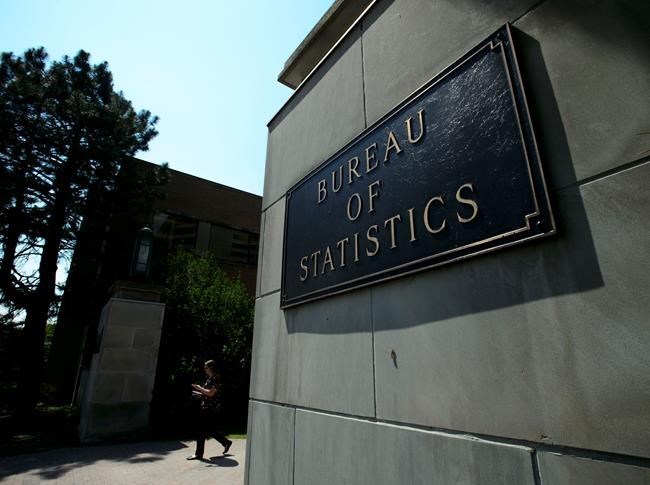
Statistics Canada building and signs are pictured in Ottawa on Wednesday, July 3, 2019. THE CANADIAN PRESS/Sean Kilpatrick
Republished November 04, 2022 - 12:00 PM
Original Publication Date November 04, 2022 - 1:01 AM
OTTAWA - The labour market showed signs of life in October with a surprise jump in the number of jobs, but economists still expect to see the economy slow more noticeably in the coming months.
According to Statistics Canada, the Canadian economy added 108,000 jobs in October. Its latest labour force survey shows the unemployment rate held steady at 5.2 per cent as more Canadians looked for work.
The October job gains come after four months of losses or little growth.
It’s also at odds with bubbling fears that the Canadian economy is headed for a possible recession as interest rates rise.
"This jobs report checked all the boxes in terms of being a blowout report," TD economist Rishi Sondhi said in a client note.
"The Canadian labour market clearly still has some steam left to it."
Employment rose across a broad range of sectors in October, led by manufacturing, construction and accommodation and food services.
Desjardins chief economist Jimmy Jean said although the report beat expectations by a significant amount, the economy is still expected to slow considerably in response to higher rates.
"What we know from history is that when that happens, you see a slowdown in consumer spending, in housing as well," Jean said. "And that tends to lead to [an overall economic] slowdown."
However, Jean said that slowdown doesn't necessarily have to be severe or long-lasting.
The Bank of Canada has been raising interest rates aggressively this year in response to decades-high inflation. It's signalled it plans to raise rates further, though the end of the rate-hiking cycle appears to be near.
Desjardins forecasts the central bank will opt for a quarter-percentage point rate hike in December, the smallest increase since March 2, though Jean said he's planning to wait for new economic data to assess whether that forecast needs to change.
The Bank of Canada's most recent quarterly outlook accounted for a significant slowdown, suggesting economic growth will stall in the coming months and into the first half of 2023. It also noted that slightly negative growth, which could meet the criteria for a recession, is just as likely.
Economic data has been difficult to interpret lately for economists trying to parse out how higher interest rates will affect the economy. Fabian Lange, an economics professor at McGill University, said a monthly bump or decline in jobs numbers shouldn't be assigned too much weight on its own.
At the same time, he said the labour market hasn't shown signs of a slowdown yet.
"I'm not saying we are not going to have a recession or we're not going to have a slowdown. But the labour market right now doesn't tell us that that's what's happening."
As high inflation pushes up the cost of living, many Canadians have lost purchasing power over the last year despite some wage growth. Wages were up 5.6 per cent in October compared to a year ago, while the annual inflation rate was 6.9 per cent in September.
"We essentially have a very strong labour market and wage growth kind of lagging behind," Lange said.
Wages can take some time to respond to inflation, he added, though whether workers will actually make up losses to inflation is still uncertain.
Friday's report highlights that high-wage earners were more likely to experience a wage increase over the last year compared with lower-wage earners, further widening the gap between them.
Among workers who have been with their employer for the last 12 months, nearly two-thirds of workers earning more than $40 an hour got a raise. In comparison, half of workers making less than $20 an hour saw their wages go up.
The employment rate among Canadian immigrants aged 15 and older reached a record high in October at 62.2 per cent.
With inflation this year reaching levels not seen in four decades, the report surveyed Canadians on their financial situations. More than a third of Canadians said they were finding it difficult or very difficult to meet their financial needs. Two years ago, just over one fifth of Canadians reported the same challenges.
Workers in accommodation and food services, retail trade and transportation and warehousing were among the most likely to report financial challenges.
Wages in accommodation and food services as well as retail trade fall below the national average and workers in these industries are more likely to be employed part-time.
This report by The Canadian Press was first published Nov. 4, 2022.
News from © The Canadian Press, 2022